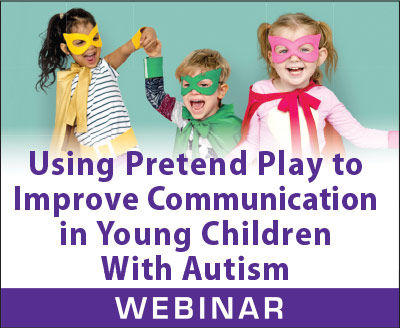ASHA Learning Pass
Log in and check out the Dashboard to view featured courses.

Using Pretend Play to Improve Communication in Young Children With Autism (WEB17224)
This webinar explains how improving pretend play skills in preschool children with autism spectrum disorder (ASD) can “play it forward” to improve a wide array of social and communication skills. Linda Watson and Jessica Dykstra Steinbrenner provide practical information to aid speech-language pathologists in selecting goals and strategies that will support the expansion of pretend play in young children with ASD.
Learning Objectives:
You will be able to:
- explain to parents, teachers, and administrators how working on pretend play goals can contribute to improved social and communication skills in children wi1th ASD
- use a developmental play sequence to choose appropriate, individualized pretend play goals, and apply decision rules to determine when to modify play goals
- select play intervention strategies adapted to behavior and learning patterns common among young children with ASD
Contents
- Introduction/Overview (4 min.)
- Impact of Play on Social and Communication Skills (12 min.)
- Observing Play and Selecting Goals (44 min.)
- Play Intervention: Strategies and Examples (60 min.)
Presenter Information
Linda Watson, EdD, CCC-SLP, is a professor of Speech & Hearing Sciences at the University of North Carolina at Chapel Hill and brings more than 30 years of clinical and research experience with children with autism spectrum disorder (ASD). Since 2007, she has been involved in the development and evaluation of an intervention to improve pretend play and social communication skills in preschoolers with ASD, carrying out research on this intervention within public school classrooms across four states. Watson’s keen interest in research that applies to “the real world” also is reflected in other projects, including the development and validation of a parent questionnaire to identify 1- year-olds who are at risk for later diagnoses of ASD and a study in which she and her colleagues used this questionnaire to identify infants at risk for ASD at 12 months of age and then evaluated the effects of providing in-home coaching to their parents on the use of responsive strategies to support their infants’ social communication and sensory-regulatory development. Watson enjoys serving as a research mentor to undergraduate, master’s degree, and doctoral students and teaching Introduction to Research Methods to graduate students in SLP and AuD programs, preparing them to evaluate the applicability of research findings to clinical practice questions
Financial Disclosures:
- Professor at University of North Carolina at Chapel Hill
- Grant funding from the Institute of Education Sciences, NIH/NICHD, Autism Speaks, and Cure Autism Now
- Financial compensation from ASHA for this presentation
Nonfinancial Disclosures:
- ASHA member
Jessica Dykstra Steinbrenner, PhD, CCC-SLP, is a research scientist at Frank Porter Graham Child Development Institute at the University of North Carolina at Chapel Hill. She has been working with individuals with autism spectrum disorder for more than 15 years. She has clinical or research experience in preschool, elementary school, middle school, and high school settings. She worked as a graduate research assistant on two research grants related to the Advancing Social-Communication and Play (ASAP) intervention with Dr. Linda Watson and then received a small grant to adapt the intervention for elementary school settings. Steinbrenner’s research interests are school-based interventions, social communication, engagement, and individuals with autism spectrum disorder (ASD) with the most significant communication needs. Her current projects include studying a comprehensive intervention for high school students with ASD, developing online modules for paraprofessionals working with students with ASD, and updating a systematic review on evidence-based practices for individuals with ASD.
Financial Disclosures:
- Research scientist at University of North Carolina at Chapel Hill
- Grant funding from the Organization for Autism Research
- Financial compensation from ASHA for this presentation
Nonfinancial Disclosures:
- ASHA member
- International Society for Autism Research member
Assessment Type
Self-assessment—Think about what you learned and report on the Completion Form how you will use your new knowledge.
To earn continuing education credit, you must complete the learning assessment by October 27, 2023.
Program History and CE Information
Content origination date: October 25, 2017
End date: October 27, 2023

This course is offered for 0.2 ASHA CEUs (Intermediate level, Professional area).